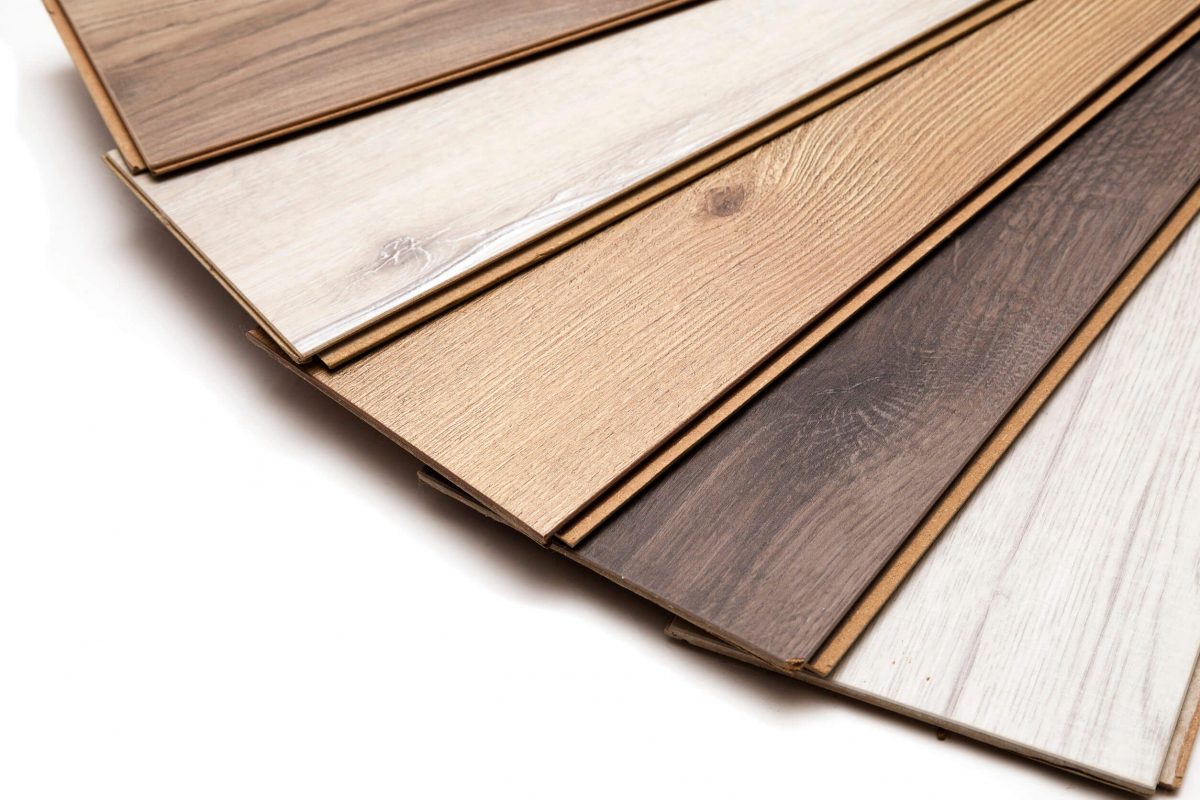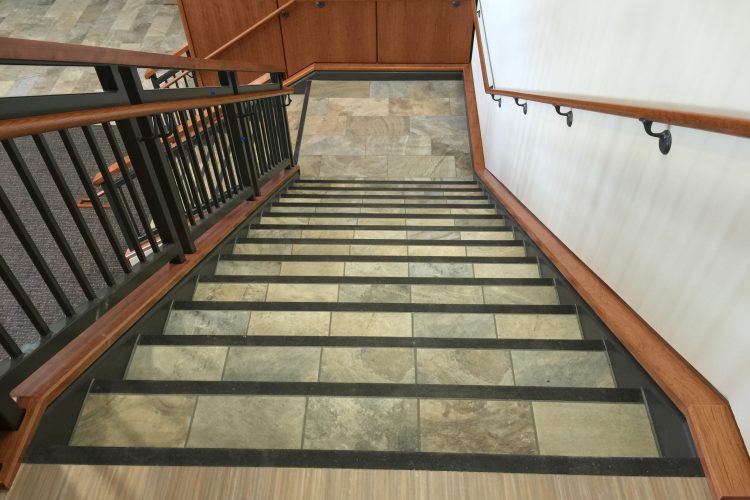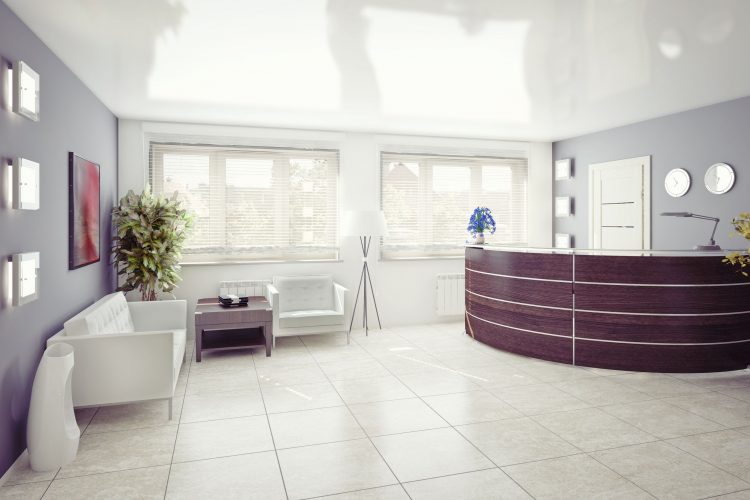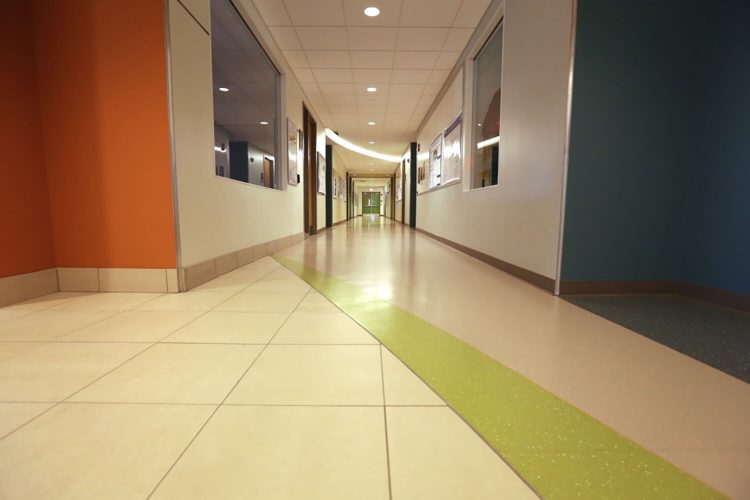Commercial Laminate Flooring: Advantages & Options

Whether you have a bustling office or a busy store, laminate flooring is a sleek, low-maintenance, durable, and cost-effective flooring option. Let’s take a few moments to learn more about this material and the advantages of laminate flooring for commercial properties.
What is Laminate Flooring?
Laminate flooring is an incredibly versatile and cost-effective solution for commercial spaces. It is composed of several layers that are pressed together, creating a durable and sturdy base for both residential and commercial projects. The top layer is a photographic image which gives laminate flooring a realistic look of hardwood, tile, bamboo, or stone, giving you many choices to match the design aesthetic of your brand and commercial space. Commercial laminate flooring can also be customized with textured finishes to suit the needs of any business environment.
There are four primary parts to every laminate floor. Each layer plays a significant role in the floor’s durability and appearance:
- Wear Layer: The top layer made out of aluminum oxide clear coat.
- Pattern Layer: This layer essentially provides a photograph of the desired texture that repeats through the different planks.
- Substrate Layer: This layer is made up of high-density fiberboard or medium-density fiberboard, both of which are comprised of wood fibers.
- Backing Layer: This is the balancing layer that resists moisture and stabilizes the entire floor.
All the layers of laminate flooring are put together using immense pressure and high levels of heat. This flooring generally comes in one of four thicknesses, which can be six millimeters, eight millimeters, 10 millimeters, or 12 millimeters.
Laminate Flooring Options (Faux Wood, Tile, and More)
Decades ago, laminate flooring choices were limited. Today, you can find laminate flooring that looks like wood. You can even choose laminate flooring that looks like tile. The possibilities are endless.
With a variety of brands, styles, and colors, there are many laminate flooring options appropriate for commercial properties.
Furthermore, this type of flooring does not have defects. Each board or plank is of consistent quality and workmanship.
Many options now reduce the slippery quality of laminate flooring with textured surfaces. There are also choices available that reduce the hard feel of laminate.
If you are searching for a sustainable flooring choice, there are eco-friendly options for laminate floors. For instance, look for flooring made of recycled materials.
The Advantages of Laminate Flooring for Commercial Properties
Laminate flooring is among one of the best values in the industry. It stands up to heavy traffic, resists staining and scratching, and can be easily wiped clean with minimal effort. It has a similar look to hardwood floors without the hefty cost associated with other kinds of traditional floors. Furthermore, commercial laminate flooring is often designed specifically to meet the needs of commercial spaces such as hospitals, office buildings or retail stores. Let’s take a few moments to learn more about the benefits of laminate flooring for commercial properties.
Affordability
For a number of reasons, laminate flooring is an affordable choice. Even the most expensive laminate is usually significantly less than other flooring choices.
Laminate flooring installation has changed over the years from a fairly complicated process to one that is relatively straightforward. You can even install it on top of existing floors, reducing the labor needed to remove old flooring.
All of this makes a laminate floor one of the best bargains around.
Maintenance and repair of laminate flooring is relatively easy, though it should never be installed in areas that have high humidity such as a bathroom, kitchen or laundry area.
Durability
Commercial floors should be sturdier than flooring in residential settings. Laminate used for commercial flooring is optimized for high foot traffic and includes a thick, high-quality laminate wear layer that protects the underlying photographic layer. This makes most commercial laminate flooring resistant to dents and scratches.
This durability also makes laminate flooring resistant to stains. If a stain does occur, it is typically easy to clean laminate.
How long the flooring will last depends on the type you buy and the level of traffic the flooring sees. A general estimate is that laminate will last between 10 and 25 years. Laminate flooring is particularly suitable for showrooms, office spaces, and other areas that see lots of foot traffic.
Laminate also repels mold and bacteria, prolonging its life and making it more sanitary than other flooring options.
When choosing laminate flooring, note its AC rating. Ranging from AC 1, the least durable flooring, to AC 5, the most durable flooring, these ratings communicate a floor’s overall resistance to a number of factors such as scratches and stains. For commercial flooring, we recommend you aim for AC 4 or AC 5. Anything lower may have trouble withstanding the constant use your space experiences.
Versatility
Laminate flooring looks great in many kinds of commercial properties and it can be installed quickly. Its mix of durability and ease of maintenance make it a good choice in a variety of business environments.
Laminate’s physical characteristics make it easy to clean, which helps keep custodial costs low.
It also has shock-absorption properties, thanks to an underlayment that gives the material a springy feel. As a result, people could become less fatigued while standing on and walking across a laminate surface compared to other types of floors.
Laminate Flooring vs Vinyl Composition Tile
Laminate flooring and Vinyl Composition Tile (VCT) are two of the most popular commercial flooring choices on the market today. While they share certain qualities, there are key differences between them that should be taken into consideration when making a decision about which one is right for you.
Laminate flooring is more affordable and easier to install, but it doesn’t have the durability or resistance to scratches, dents and staining that comes with VCT. VCT also is more resistant to water damage and wear and tear, which makes it ideal for areas of higher foot traffic like restaurants or reception areas. When choosing between laminate flooring vs VCT flooring, the amount of foot traffic and budget are important factors to consider.
Get in Touch With Us Today To Discuss Your Options for Commercial Flooring
It’s clear why so many commercial property owners select laminate flooring for their office.
Whether you’ve settled on using laminate flooring or are still unsure, we are ready to provide advice and assistance, including handling installation needs.
Call us today at 585-444-0105 or fill out our contact form to get started.
Related Posts

Durable Commercial Flooring: Everything You Need to Know About Different Types

Commercial Porcelain Tile: Why It’s a Great Option Compared to Ceramic Tile

